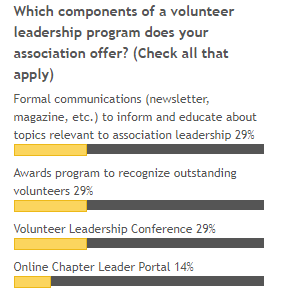Did You Know? Communication, Training and Recognition Are Key to Successful Volunteer Management

Associations rely heavily on volunteers to get things done. From board directors to name tag labelers, mentors to phone tree participants and every position in between, volunteers play a mission-critical role in the operation of a successful association.
Nurturing volunteers is important not only to the success of an association but for the personal and professional fulfillment of those volunteers. Most people sign up for a program or task out of the goodness of their hearts but also with a desire to learn a new skill, add to their resume, and/or network. If they do not see a personal return on their investment of time and energy with an organization, they aren’t likely to continue to volunteer. So it’s essential for associations to offer volunteers the tools they need to feel successful, not only in terms of the tasks they work on for the organization but the personal and professional growth they are expecting to experience as well.
“I think of our volunteer program as a mentorship program in disguise,” said Lori Kinsey, executive director of MPI Northern California. “MPINCC members are encouraged to engage with committees of their choice and learn from committee chairs in the process. Volunteer committee members are well-positioned to become committee chairs, chapter directors and executives. Volunteering helps them professionally grow their skills and connections in addition to being a personal growth kind of experience,” she continued.
To support such goals, an association’s volunteer management program should have at least a few formal communication, training and recognition components. Newsletters and magazines are common ways to distribute information regarding volunteer-supported programs to this special subgroup. Almost one-third of participants in our August poll said they maintain one or more of these formal communications, although it should be noted that “formal” in this context simply means ”regular.”
Conferences and always-available online portals are another way associations can keep in touch with volunteers, encourage knowledge sharing and develop desired skills. Online communities allow volunteers to cultivate and own their community and develop relationships at a natural pace, while conferences present volunteers with a chance to meet up and learn from speakers, trainers and each other in an energizing environment. Twenty-nine percent of poll respondents say they host a volunteer leadership conference, while 14 percent of respondents say they maintain an online chapter leader portal for their volunteer community.
Finally, recognizing volunteers for the work they donate to your association lets them know they are seen and appreciated. Another one-third of poll respondents say they host an awards program to recognize outstanding volunteers. As an association grows in industry prominence, these types of awards can carry weight within the professional community and become a hallmark of distinguished professionalism.
Full results of the poll as of 8/30 are below:

Did we miss an element of volunteer management that is essential to your association’s volunteer program? Let us know in the comments below.

